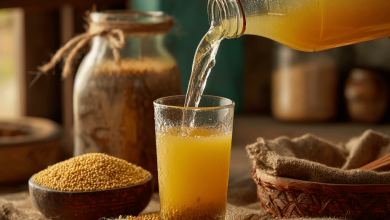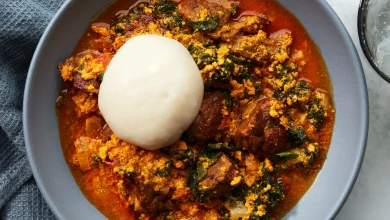Abacha and Ugba Recipe: Nigerian Cassava Salad with a Spicy Twist
Welcome to Love With Recipes, where we bring you the vibrant flavors of Nigeria’s culinary heritage! Today, we delve into a classic dish beloved in the southeastern region of Nigeria: Abacha and Ugba, also known as African Salad. This cassava-based salad is a delightful medley of textures and flavors, featuring the unique tang of fermented oil bean seeds (ugba), the rich essence of palm oil, and the smoky goodness of dried fish. Whether you’re hosting a cultural feast or seeking a hearty yet healthy meal, this recipe is your gateway to a taste of Nigeria.
Ingredients
| Ingredient | Quantity | Description |
|---|---|---|
| Cassava (abacha strands) | 500g | Thinly sliced, soaked, and rinsed (or prepackaged). |
| Fermented oil bean seeds (ugba) | 200g | Soaked and rinsed to remove excess saltiness. |
| Palm oil | 100ml | Unrefined, for that authentic taste and color. |
| Dried fish or smoked mackerel | 200g | Deboned and shredded. |
| Ground crayfish | 2 tbsp | Adds depth and umami to the dish. |
| Fresh utazi leaves | 5–7 leaves | Thinly sliced for a slightly bitter, herbal note. |
| Fresh garden eggs (optional) | 2-3 | Sliced, for garnish. |
| Scotch bonnet peppers | 1–2 | Finely chopped for spice. |
| Onion | 1 medium | Thinly sliced. |
| Potash (akanwu) | 1 tsp | Dissolved in water for emulsifying the oil. |
| Seasoning cubes | 2 cubes | Adjust to taste. |
| Salt | To taste | Balances flavors. |
| Water | As needed | For soaking and softening the abacha strands. |
Nutritional Information
| Nutrient | Approx. Amount per Serving |
|---|---|
| Calories | 290 kcal |
| Protein | 12g |
| Carbohydrates | 34g |
| Fats | 12g |
| Fiber | 5g |
| Vitamins A, C, and E | High |
| Sodium | 380mg |
Instructions
Step 1: Prepare the Abacha Strands
- If you’re using dried abacha strands, soak them in lukewarm water for about 10–15 minutes until soft.
- Rinse thoroughly to remove any impurities, then drain and set aside in a colander.
Step 2: Prepare the Ugba
- Rinse the fermented oil bean seeds (ugba) thoroughly in warm water to reduce saltiness and enhance its natural flavor.
- Drain and set aside alongside the abacha strands.
Step 3: Create the Palm Oil Base
- In a medium-sized mixing bowl, dissolve the potash in a small amount of warm water (about 2–3 tablespoons).
- Carefully strain the potash solution into a separate bowl, leaving behind any sediment.
- Gradually add the palm oil to the potash solution, stirring continuously until the mixture emulsifies into a vibrant orange paste.
Step 4: Combine the Ingredients
- Into the palm oil mixture, add the ground crayfish, sliced onions, Scotch bonnet peppers, seasoning cubes, and a pinch of salt. Mix thoroughly.
- Fold in the softened abacha strands and the prepared ugba, ensuring every strand is coated evenly.
Step 5: Incorporate the Proteins and Garnish
- Add the shredded dried fish or smoked mackerel, blending it gently into the salad mixture.
- Garnish with sliced utazi leaves and fresh garden eggs (if using).
Step 6: Serve and Enjoy
- Transfer the Abacha and Ugba to a serving dish and enjoy it as is, or pair it with a chilled beverage for a complete meal experience.
- This dish is best enjoyed fresh and warm, allowing the flavors to meld perfectly.
Tips for the Perfect Abacha and Ugba
- Substitutions: If fermented oil bean seeds are unavailable, substitute with lightly fermented soybeans for a similar flavor.
- Make it less spicy: Use fewer Scotch bonnet peppers if you prefer a milder salad.
- Meal Prep Tip: The abacha strands and ugba can be pre-soaked and stored in the fridge for up to 2 days.
Explore the rich tapestry of Nigeria’s culinary traditions with this irresistible Abacha and Ugba recipe. Its affordability, health benefits, and authentic taste make it an ideal dish for family dinners, potlucks, or even adventurous foodie gatherings.
Stay tuned to Love With Recipes for more globally inspired dishes that bring love to your table!






